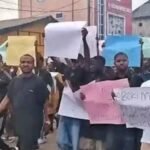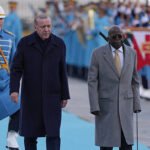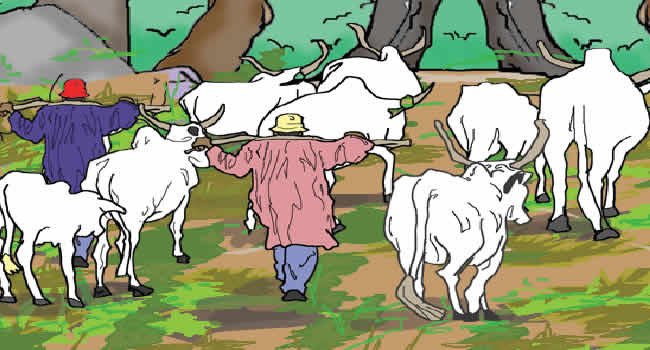By Sylvester Udemezue
(A). *BACKGROUND:*
In response to my *”An Open Letter Of National Emergency: A Call for the Creation of Special States for Fulani Herdsmen,”*_ (published on 02 June 2025), I received several comments, observations, responses and reactions from both colleagues and the general public. Two of those reactions, which I see as respectful rejoinders, are reproduced verbatim below, and together form the basis of my present commentary which is just my humble response to the incisive rejoinders:
(1). *FIRST REJOINDER (by a Senior Advocate of Nigeria):* “Have you read Cyprian Ekwensi’s Burning Grass (1962)? There you will know the root cause of Fulani restlessness. So even if you give them the whole of Nigeria, you will not be able to conquer that restless spirit of adventurism in them. It is called ‘Sokugo- The Wandering Disease. These people are found all over Africa even up to Kenya, Burundi and Rwanda bearing different tribal names but exhibiting the same acquisitive land grabbing tendencies. So even if you give them two States which is not possible, they still would not be satisfied. At any rate, which States will you unilaterally allot to them that do not already have authoctonous owners. Why have limited the designated State’s to states within the North-West and North East Regions. Why not allocate to them Enugu or Imo States, where there is a lot of sweet grass for their millions of cows and even other mineral resources as extra. Your suggestion will not work. Please do not publicize these suggestions, it is with respect a very simplistic solution to a very complex problem. Nice effort though.”
(2). *SECOND REJOINDER (by a Law Professor):* _”Good morning sir. Thx for yours. I agree that we are in a serious situation & doing nothing is not an option. However, the first rule in such situations is “Do No Harm.” The idea of 2 states for pastoralists wld do terrible harm. Let me offer 5 quick takes why. To begin with, it will make the point that the way to get new states is terrorism. Nigeria will cease to coexist. 2nd, pastoralists are in the North. So, your 2 new states will be in the North. That means the North will have at least 3 more states than the South. The federalism will be unbalanced to a point of unviability. 3rd, govt has said repeatedly that the pastoralists doing this are “foreigners”. So, u will create 2 new Nigerian states for foreign terrorists? 4th, the idea of creating states for pastoralists means compulsory sedentarization. If sedentarization is a solution, why does it need new states to be implemented? 5th, if you are going to create states strictly for pastoralists, what happens to the constitutional rights to freedom of movement & to property? For your idea to work, you will have to make internal banishment lawful, no?”_
(B). *MY COORDINATED RESPONSE TO THE TWO REJOINDERS:*
Good morning, Learned Prof, and Esteemed Silk. I wish to thank you both profoundly for your frank, thoughtful, and illuminating responses to my modest proposal. Your interventions are not only intellectually weighty but also a necessary part of the dialogue that I had hoped to inspire. With your kind permission, I humbly offer the following respectful rejoinder, structured around the vital concerns you have each raised.
1. First, let me humbly acknowledge the powerful symbolism in Prof’s admonition to “Do No Harm.” It is a timeless principle of good governance. Yet, I submit that doing nothing in the face of a metastasizing national security crisis can also constitute grievous harm. My proposal is not final or infallible. It is, rather, a conversation starter, an attempt to engage constructively with an issue that continues to devastate lives and test the limits of our statehood.
2. *On the Risk of Incentivizing Terrorism:* Prof rightly warns that creating states for pastoralists may appear to reward violence, thereby sending a dangerous message. However, I respectfully note that Nigeria has long applied a form of “carrot and stick” strategy to internal security challenges. For example, the Niger Delta Amnesty Programme of 2009 combined demobilization with stipends, training, and infrastructure investment, not because militancy was justified, but because peace became urgent. Similarly, the Federal Government’s Operation Safe Corridor provides rehabilitation for Boko Haram defectors. Again, this is not endorsement but pragmatic conflict management. In truth, Nigeria has selectively engaged, arrested or appeased, rehabilitated agitators like Sunday Igboho and Nnamdi Kanu, depending on its evolving security calculus. My proposal does not reward terror. It seeks to prevent its recurrence by offering structured, legal, and monitored alternatives to unregulated nomadism. Dorothy Thompson once said: “Peace is not the absence of conflict, but the presence of creative alternatives for responding to conflict.” That is what this idea aspires to, creative alternatives.
3. *On Federal Imbalance and State Creation:* I agree entirely that creating two northern states could exacerbate Nigeria’s already fraught federal balance. But this need not be the end of the matter. Simultaneous creation of long-demanded southern states, Aba or Anioma (South-East), Oil River (South-South), Ijebu or Oke-Ogun (South-West), can restore parity and reflect the spirit of federal equity. Indeed, Nigeria has historically adjusted its internal structure in response to pressures of imbalance and agitation, moving from 3 to 12 to 19 and eventually 36 states. State creation has always been a tool for pacification, inclusion, and structural reform.
4. *On the Question of “Foreign Terrorists”:* I fully acknowledge the danger in granting legitimacy to foreigners posing as pastoralists. But let us be honest: these actors are already within our borders, unchecked, unregulated, and often indistinguishable from local Fulani communities. Our border control is weak, ECOWAS protocols are abused, and mass deportation is no longer logistically or diplomatically feasible. Thus, the question becomes: Shall we continue to pretend they are not here while our villages burn? Or shall we isolate the threat, regulate entry and identity, and create a safe, monitored space for law-abiding herders? This is not appeasement; it is containment. Of course, only Nigerian citizens who are verifiably law-abiding would be entitled to any such settlement. No foreigner would be settled without due process. The proposed states would remain subject to Nigerian law, sovereignty, and constitutional safeguards.
5. *On Sedentarization and Constitutional Rights:* Concerns have been raised that the proposal could infringe on freedom of movement (Section 41(1)) and the right to own property anywhere in Nigeria (Section 43). Respectfully, I do not believe this is the case. The proposed states would not restrict movement or property rights. Any Nigerian, regardless of ethnicity, religion, or occupation, would be free to reside, trade, or worship within them. What would be restricted is the practice of open grazing, not movement. Grazing is not a constitutional right. As Roscoe Pound once wrote: “Rights are not absolute. They end where the rights of others begin.” This proposal is akin to the creation of the Federal Capital Territory (FCT), where indigenous peoples were relocated or absorbed into a new national vision. Today, Abuja is not “owned” by any group, yet it exists for a national purpose. In the same spirit, these new states are envisioned not as ethnic enclaves, but as peace infrastructure.
6. *On the Cultural Challenge of Sokugo (The Wandering Disease):* Learned Silk’s invocation of Burning Grass and the concept of Sokugo is both poetic and profound. I accept that no state creation can fully cure the inherited restlessness of a nomadic tradition shaped over centuries. But statecraft is not about perfection, it is about mitigation. If we cannot legislate the spirit of adventure out of any people, can we at least channel it into safe, lawful, and accountable systems? Should we not create zones where modern ranching can coexist with cultural heritage under a watchful legal framework?
7. *On the Question of Land and Indigeneity:* Silk also asks: Which territories will be ceded to these pastoralists? Indeed, every inch of Nigeria belongs to someone. I do not propose expropriation. Rather, I envision federal-led negotiations with states facing the worst herder-farmer conflicts, possibly in the North-East or North-West, to designate underutilized federal land or grazing reserves as part of a wider peace package. This would require national consultation and constitutional reform. The idea is not to dispossess, but to reorganize, to contain a threat and enable peaceful cohabitation through enforceable rules.
8. *On Simplicity versus Complexity:* I agree this is a complex problem, one with historical, cultural, economic, and ecological layers. But I respectfully submit that the simplicity of a proposal should not be grounds for its dismissal. Sometimes, it takes a bold yet simple idea to unlock long-stalled national conversations. As Martin Luther King Jr. once said: “We must accept finite disappointment, but never lose infinite hope.” This is not a final blueprint. It is a call to confront a hard problem with courage, not complacency.
9. *The Stakes Are High:* As I write, lives are being lost in Benue, Plateau, Nasarawa, Taraba, Kaduna, Niger, Delta, Borno, Sokoto, Katsina, Zamfara, Oyo, Enugu, Ebonyi, Edo and beyond. The status quo is unbearable. We must choose: (a). Shall we keep deploying troops and summoning peace committees to no lasting effect? (b). Shall we cling to outdated notions of federal uniformity while communities perish? (c). Or shall we risk political discomfort to try something new, if only to save lives?
10. *Mine Is A Proposal with Safeguards:* The idea contemplates: (a). A national absolute ban on open grazing; (b). Compulsory ranching within the new states; (c). Federal or joint security installations within and around the zones and all states; (d). Biometric registration of all pastoralists; (e). Automatic forfeiture of benefit or expulsion for non-compliance. This is not displacement. It is peace by structure. It is justice through pragmatism. As Awolowo once wrote, “Peace is the product of justice. When you cannot get justice through legal channels, you must create a system that restores balance without violence.”
11. *My Concluding Response:* Let us, respectfully, reject rhetorical purity for humane realism. We must move from paralysis to pragmatism. I do not claim to have the best idea. But I believe that the worst idea is to ignore the problem or pretend that time and talk will resolve it. I thank you again, great scholar and distinguished senior advocate, for challenging and enriching this discussion. I respectfully invite you each and both to help refine or even replace this idea with a better one, one that our bleeding country so desperately needs.
Warmest regards, Prof and Learned Silk, Sirs.
Respectfully,
Sylvester Udemezue (udems),
Proctor, The Reality Ministry of Truth, Law and Justice (TRM) [A Nongovernmental, Nonaligned, Nonprofit Public Interest Law Advocacy Group]
*Tel:* 08021365545 | 08109024556.
*Email:* TheRealityMinister@Gmail.Com









